- Home
- Steven Brust
Sethra Lavode Page 7
Sethra Lavode Read online
Page 7
But, for whatever reason, or combination of reasons, Zerika, on that day, at that hour, came to the realization that she could no longer concentrate on her work; that she (as does everyone, whether engaged in physical labor, mental calculation, or emotional turmoil) needed to rest herself. This may appear to be a small matter—an accident, no more; yet, what is history except the arrangement of accidents, combined with the activity of human will operating on those accidents? To put it another way, one might say that man, who sets out to make history according to his wishes (although, to be sure, he is usually unaware that he is doing so) must perpetually weave his way in and out of happenstance and chance incidents; some far-reaching in their effect, some so trivial as to be lost, receding in the ocean of events before their occurrence, like a speck of sand upon the beach, can even be noted.
The reader may ask: Is it the actions, more or less deliberate, of men striving to make the world as they wish that determine the eventual course of history, or is it the preponderance of accidents? One must admit that if the answer were simple, the Imperial library would not be packed full of books purporting to answer this very question; the entire discipline of historiology would not exist. But for our purposes, the answer is this: Both factors weave in and out of each other, men doing the best they can with circumstances that might have been determined by caprice or chance, and then, in attempting to shape events, generating, as an icehouse generates steam, a fresh outpouring of accidents; a process that continues forever.
And, in this case, the accident was that it was on this day, rather than the day before or the day after, that Zerika happened to decide, to the extent of throwing her pen across the room, that she had had enough work, and must give herself something of a holiday or else she would, as she put it to herself, "either dissolve into the Orb, or explode like my predecessor."
Having come to this decision, then, Zerika called out, "Captain! Sergeant! Ensign!" We should explain that it was not, in fact, three soldiers for whom Her Majesty called, but, in fact, only one: in such circumstances, she had been accustomed to summon the captain, and so had made the first call. She then, however, remembered that the captain was no longer on duty, and, instead, recalled to her mind his replacement, the first name on the list with which Khaavren had presented her, that being an experienced guardsman whose name happened to be Sergeant. On reflection, however, after asking for him, she thought she ought to address him by his rank, which a moment's reflection brought to her mind; it being, of course, Ensign.
Whether three or one, this worthy appeared quickly enough in answer to her call and made a respectful bow.
"Your Majesty desired something?"
"Yes, Ensign. I desire to be entertained."
The worthy soldier frowned. "I beg Your Majesty's pardon, but, while I know a few barracks songs well enough to sing them when there are enough other voices so that mine is lost—"
"No, you idiot. I am not asking you to entertain me."
"Ah. Well, I tell Your Majesty in all honesty that I am just as glad."
"I wish to know," said Zerika, speaking slowly and carefully, as one might speak to an outlander or a small child, "what entertainments are available this evening—entertainments that it would not compromise the dignity of the Orb for me to be at. I require distraction, life, noise."
"Your Majesty, how am I to tell?"
"How? Well, there is a stack of invitations on that table in the corner; go and see if any of them are dated this evening."
"Yes, Majesty."
Sergeant crossed to the indicated table, picked up the topmost of the rather large pile of letters, and, after glancing at it, announced, "Today the Count of Southmoor celebrates the completion of his home, Castle Black."
"What do you tell me?"
Sergeant repeated what he had said.
"Southmoor, do you say? Morrolan?"
"Yes, Your Majesty."
"But, it has been less than a year!"
"It seems, Your Majesty, that he has an astonishing number of Vallista at his disposal."
"Well, but, why wasn't I informed of this?"
"But Your Majesty was informed—the invitation is here, on thin black paper with gold lettering, addressed to: 'Her Imperial Majesty, Zerika the Fourth, House of the Phoenix, Empress of Dragaera, at Whitecrest Manor, Adrilankha.'"
"Bring it here."
Sergeant handed the invitation to Her Majesty with a bow. Zerika looked at it carefully, and noted that, in fact, it was not written on thin paper, but, rather, on silk; and, moreover, the lettering itself was, in fact, gold.
"Well, that is certainly addressed to me. And the proof is, the invitation is here. And, moreover, it does not lack for style."
"Then shall I make arrangements?"
"Yes, do so."
"Very well. But—"
"Yes?"
"What arrangements am I to make? That is to say, how will you get there?"
"Do you remember a certain Athyra named Bebbyn?"
"I do."
"He is the Imperial Sorcerer. He will arrange transportation."
"Very well. What else?"
"Do you know Lord Brimford?"
"The—that is to say, the Easterner?"
"Exactly."
"I have seen him."
"Inform him that I will be at—what is the name? Castle Black. That I will be at Castle Black this evening."
"Yes, Majesty."
"And find my maid," said Zerika, standing up. "Send her to me in my apartment. I go now to dress."
The Empress was going to the ball.
Chapter
the Seventy-Fourth
how the entertainment at castle black took place
It was on a Skyday in the winter of the first year of the reign of the Empress Zerika the Fourth that Morrolan opened the doors of Castle Black. Lady Teldra was there to greet the guests, who included, among others, Sethra Lavode, Sethra the Younger, the Sorceress in Green, the Necromancer, Viscount Lászlo of Brimford (that is, the Warlock), Khaavren, Aerich, Tazendra, and three score or so of nobles of various Houses, mostly Dragon, who were either teleported in by Morrolan himself, who had fairly mastered the art, or were levitated up to the courtyard after arriving below it by some other means.
It is worth mentioning that this event, quite aside from its effect on the history we have taken it upon ourselves to relate, marks the first time an entertainment was given to which any of the guests (not to mention most of them) arrived by teleportation, and, as such, is significant to those who make a study of the social customs of such affairs. While no doubt interesting, such a study is beyond the scope of this history, wherefore we will content ourselves with the mere observation of the fact.
Morrolan himself was kept busy answering questions, most of them having to do with the problems unique to construction carried on far off the ground. Even endless repetitions of the remark "Well, it is certainly a defensible position" or near variations did nothing to depress his spirits—he smiled and laughed and greeted his guests through the night, at one time remarking to Teldra, "This is very nearly as enjoyable a pastime as battle."
Morrolan had arranged for confections from Nacine, where there were two quite respectable bakers. In addition, he had imported creepers from the Shallow Sea, squabs from the Southern Coast, beef and kethna from the surrounding peasants (prepared by chefs discovered and recommended by Teldra), and wines from as far away as Aerethia. For entertainment, he had raided both Hartre and Adrilankha for instrumentalists, singers, and jongleurs, as well as bringing in several of the local peasant orchestras, with their traditional instrumentation of violin, bagpipe, fretted demkor, and slim-whistle. There were, as well, a number of cittern players, some of them quite skilled, others only providing accompaniment for their voices, which in these cases was never less than pleasant.
The ball-room, which had nearly been a temple, and before that had been a room of some unknown purpose, served its function quite well: there was not only easy
access to the kitchens and storage lockers, but, in the event, the small alcoves connecting to it were perfect places for those who desired a few minutes of private conversation, and were thus in nearly constant use.
Khaavren, dressed in a pure white shirt with ruffled collar and sleeves, an azure doublet, blue leggings, and black boots, accompanied the Countess of Whitecrest, who had made, it must be admitted, a spectacular toilet. Her dark hair was swirled up, held in place by a golden pin set with four pearls. Her gown was bright red, cut low enough to attract interest, and it fell quite simply to her trim ankles—its only shape was Daro's shape, which was certainly sufficient. The gown featured tall wings of lace upon the shoulders creating a sort of frame for her lightly powdered face. Around her neck hung another string of pearls, this one so long that it fell nearly to her waist. A sort of sash or baldric of bright, shimmering blue ran loosely from her left shoulder to her right hip, and on it were three small rubies. Her shoes were white, buckled, and adorned with a sapphire upon the toe. She had rings on each hand, one a pearl, the other a ruby. Upon seeing her complete ensemble as they prepared to leave Whitecrest Manor, Khaavren had observed, "Madam, it would appear that, today, I am an accessory."
Khaavren met Morrolan in the ballroom, and, bowing deeply, said, "My lord Morrolan, Count of Southmoor, permit me to present my wife, Daro, Countess of Whitecrest."-
For the sake of completeness, we ought to mention that, by advice from Teldra, Morrolan had dressed very simply, in an elegant black and silver warrior's costume—Teldra pretended that, as the host, he ought not to wear anything that might make any guest feel he had paid insufficient attention to his toilet.
"But," said Morrolan, "is it not as bad if someone feels he has gone to too much trouble?"
"No one will feel that way on this occasion," said Teldra. "Your invitation will insure that."
"How, it will?"
"You will see."
Having made this necessary interruption, we return to the introduction of Daro and Morrolan. The Dragonlord made a courtly bow (Teldra had gone to some pains to show him how this was properly done) and kissed her hand. Daro, for her part, made a thousand compliments on his castle, not forgetting to observe the sweeping marble stairway, the elegance of the gold banisters, the fountain in the central hallway, and the three quite remarkable chandeliers, each with over two hundred candles, that graced the ballroom itself.
"You are too kind, madam," said Morrolan. "May I show you and my good friend Khaavren where we have hidden the wine?"
"A splendid idea, sir; we should like nothing better."
"But," observed Khaavren, "Cha! Who is this I see guarding the wine?"
"Not guarding it in the least, my dear Khaavren," said Aerich. "Rather, standing in what I knew would be the best position to intercept you."
"You are right once more, my friend." He turned to Morrolan, saying, "I hope, sir, that I may trust you with the Countess for some few minutes while my friend and I have conversation."
"Sir," said Morrolan, "I promise that she will be entertained, but not excessively."
"That is exactly right," said Khaavren, while Daro said, "You are charming, sir."
"Your arm, Countess?"
"Here it is, Count."
"Come, I will introduce you to the Sorceress in Green."
"Ah, permit me to guess: She is the one wearing green?"
"How did you know?"
As Morrolan led Daro in one direction, Khaavren took his friend Aerich in the other, finding one of the private rooms that was, by chance, unoccupied. They took chairs, and silently toasted each other, after which Khaavren, looking carefully at Aerich, said, "If you were Pel, rather than yourself, I should say, 'my conscience pierces me.'"
"'Stabs' is the formula, my friend."
"Well, stabs then. It doesn't matter, as you are not Pel."
"No, I am not. And yet—he has become the Discreet. I am happy for him."
"Yes, his ambition is realized. Or, at least, one of his ambitions. Who knows how many he has?"
"That is true, dear Khaavren. And Tazendra has realized her ambition—Tazendra Lavode. For myself, I should never have guessed it."
"Nor I, and yet we should have. You remember how well she and the Enchantress seemed to understand one another."
"That is true, and she has always had an abiding love for sorcery."
"And what of your ambitions, my dear Aerich?"
"Mine? They are all fulfilled. I grow grapes, I watch them rum into wine, I drink the wine. What more could I want?"
"And that is enough for you?"
"More than enough, my dear friend."
"Family?"
"Perhaps, someday. It would be good to be able to pass on my estate to an heir, but I am in no hurry."
"That is good."
"Moreover—"
"Yes?"
"I very nearly have a son."
"How, you do? You, Aerich?"
"I said nearly, Khaavren. I was speaking of the young Viscount. He—but what is it, my dear friend?"
"What is it? Why, you wrote to me."
"That is true, but then, you know that the Countess wrote to me."
"Well that is true."
"She indicated that you would be pleased to speak to me."
Khaavren smiled. "I do not deny it. But she said nothing of the subject upon which I desired speech with you?"
"Not the least in the world. Does it concern your son, my friend?"
"Aerich, how did you know?"
"Because of the expression that crossed your countenance when I mentioned his name."
"It is impossible to deceive you."
"Well then, it does concern the Viscount?"
"It does, Aerich."
"Is he well?"
"I don't know. That is to say, I do not know where he is."
"How, he has vanished?"
"He has run off."
"But, he must have had a reason."
"Oh, yes. I think he had a reason."
"Well, relate the entire history to me."
"I will do so."
Khaavren described his conversation with Piro. Aerich shook his head upon learning that the young Tiassa had wished to marry outside of his House, and looked sad upon hearing of the Viscount's embittered departure.
"My poor friend," murmured Aerich.
"Tell me frankly," said Khaavren. "Have I done wrong?"
"To drive away one's own son is wicked; to permit him to marry improperly is infamous."
"Had I a third choice?"
"I don't know, my friend. I am only glad, now, that I was never faced with the challenge of raising a child during a time when there was no Empire. The Empire is all we know of right and wrong; without it, we are lost, as a ship is lost when out of sight of land, with no record of its direction and rate of sail."
Khaavren emitted a short, barking laugh—the laugh one gives out of bitterness, rather than amusement—and said, "If the Empire is all we know of right and wrong, then I am surely wrong, for I have left the Empress's service."
"Have you, Khaavren? That astonishes me."
"Well, it is good that I can still astonish you on occasion."
"Would you care to tell me why you resigned, Khaavren? You needn't if you don't wish to."
"Bah. This Phoenix annoys me."
"Does she?" said Aerich, with something of a smile. "More than the last one did?"
"Oh, the last one couldn't help it, so I didn't mind."
"You have unusual standards."
"Perhaps I do."
"So then, what will you do now?"
"I wish I knew. Aerich—"
"Well?"
"Do you think I ought to search for him?"
The Lyorn nodded slowly. "If you wish my opinion—"
"I always wish your opinion, Aerich."
"Well then, yes, I think you ought to at least speak to him."
"Ah, well!"
"Yes?"
"I must tell you, fi
rst, that I do not know how to find him."
"Yes, and after that?"
"After that? Well, if I did find him, I do not know what to say."
"As to what you will say, well, I cannot tell you. It may be there is nothing to say that will do any good. But you must try. And, as to finding him—"
"Well?"
"Perhaps, working together, we will discover a way."
"You will help me?"
"Khaavren! How can you doubt it?"
"You are a good friend, Aerich."
"Well," said the Lyorn, shrugging and permitting a smile to touch his lips.
At this moment, there was a clap outside of the door.
"Who is there?" asked Khaavren.
Someone whose voice he did not recognize said, "If that is the Lord Khaavren, late of Her Majesty's Guard, then I would beg a moment of your time."
"It is I," said Khaavren, rising and opening the door. "And I believe I have a moment to spare."
The woman on the other side of the door, who seemed rather old, with lines of care on her forehead and marks of worry beneath her eyes, was dressed as a warrior, entirely in black with not the least speck of color, and had the distinctive ears and eyes of the House of the Dzur. She bowed to Khaavren and said, "My lord, I am called Sennya."
Khaavren's eyes widened, and he said, "Your Highness? I remember you from the days before the Disaster, though you perhaps never noticed me."
"Indeed, I remember you very well, the Captain of Tortaalik's Guard. And yes, I am the Dzur Heir, but it is not as Dzur Heir that I wish to exchange thoughts with you."
"Nevertheless, madam, please accept my respectful salute, and permit me to name my friend the Duke of Arylle."

 Phoenix
Phoenix Tiassa
Tiassa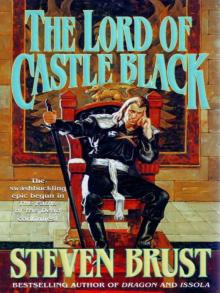 The Lord of Castle Black
The Lord of Castle Black To Reign in Hell: A Novel
To Reign in Hell: A Novel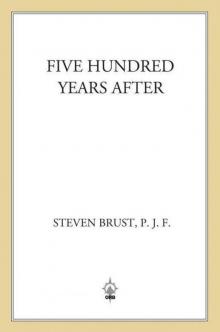 Five Hundred Years After (Phoenix Guards)
Five Hundred Years After (Phoenix Guards)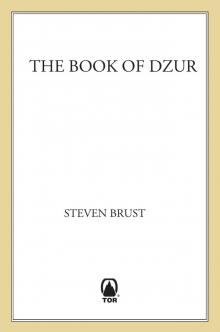 The Book of Dzur: Dzur ; Jhegaala
The Book of Dzur: Dzur ; Jhegaala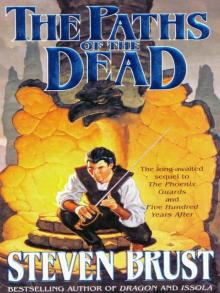 The Paths of the Dead
The Paths of the Dead Jhegaala
Jhegaala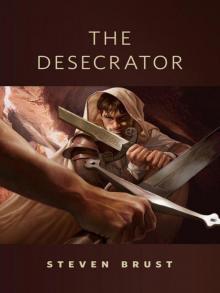 The Desecrator: A Tor.com Original
The Desecrator: A Tor.com Original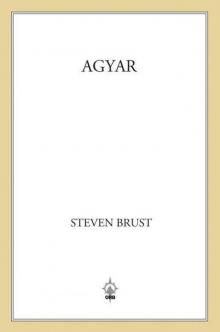 Agyar
Agyar Fireworks in the Rain
Fireworks in the Rain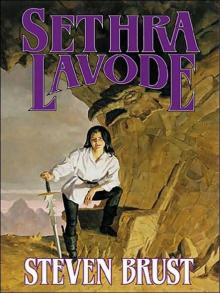 Sethra Lavode
Sethra Lavode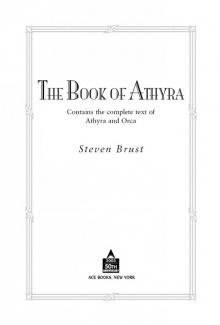 The Book of Athyra
The Book of Athyra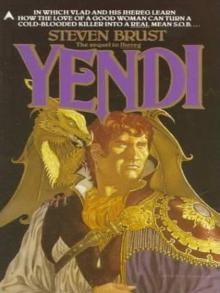 Yendi
Yendi Good Guys
Good Guys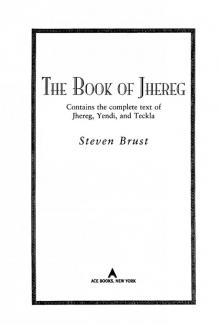 The Book of Jhereg
The Book of Jhereg Cowboy Feng's Space Bar and Grille
Cowboy Feng's Space Bar and Grille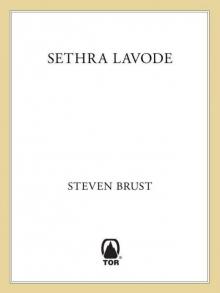 Sethra Lavode (Viscount of Adrilankha)
Sethra Lavode (Viscount of Adrilankha) My Own Kind of Freedom
My Own Kind of Freedom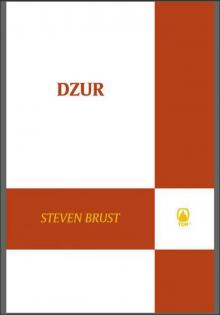 Dzur (Vlad Taltos)
Dzur (Vlad Taltos)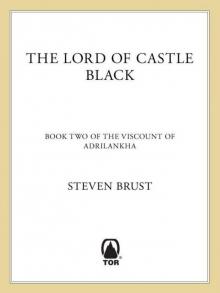 The Lord of Castle Black: Book Two of the Viscount of Adrilankha
The Lord of Castle Black: Book Two of the Viscount of Adrilankha Fireworks in the Rain: A Tor.Com Original
Fireworks in the Rain: A Tor.Com Original To Reign In Hell
To Reign In Hell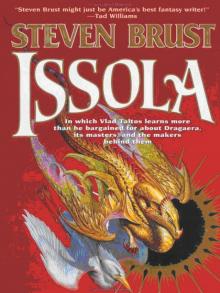 Issola
Issola Orca
Orca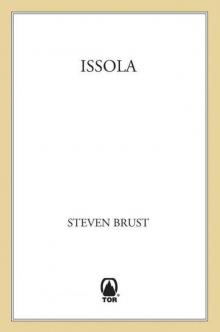 Issola (Vlad Taltos)
Issola (Vlad Taltos)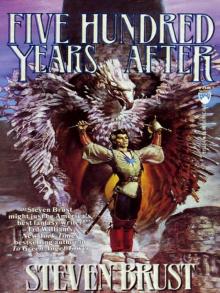 Five Hundred Years After
Five Hundred Years After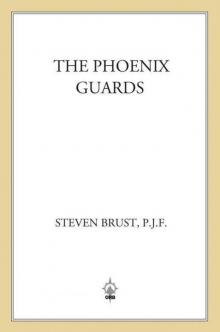 The Phoenix Guards
The Phoenix Guards Taltos
Taltos![[Vlad Taltos 06] Athyra Read online](http://i1.bookreadfree.com/i1/03/24/[vlad_taltos_06]_athyra_preview.jpg) [Vlad Taltos 06] Athyra
[Vlad Taltos 06] Athyra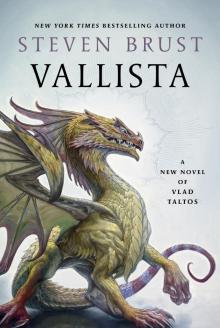 Vallista--A Novel of Vlad Taltos
Vallista--A Novel of Vlad Taltos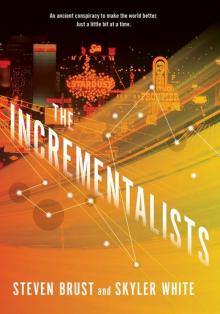 The Incrementalists
The Incrementalists![[Vlad Taltos 04] Taltos Read online](http://i1.bookreadfree.com/i/03/24/[vlad_taltos_04]_taltos_preview.jpg) [Vlad Taltos 04] Taltos
[Vlad Taltos 04] Taltos![[Vlad Taltos 03] Teckla (v 1.1) Read online](http://i1.bookreadfree.com/i1/03/27/[vlad_taltos_03]_teckla_v_1_1_preview.jpg) [Vlad Taltos 03] Teckla (v 1.1)
[Vlad Taltos 03] Teckla (v 1.1)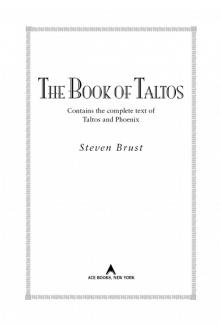 The Book of Taltos
The Book of Taltos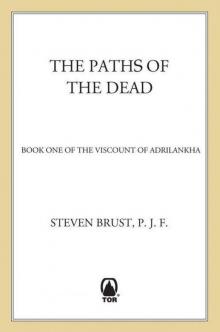 The Paths of the Dead (Viscount of Adrilankha)
The Paths of the Dead (Viscount of Adrilankha) Jhegaala (Vlad Taltos)
Jhegaala (Vlad Taltos)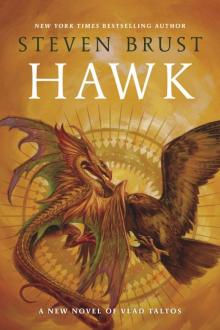 Hawk (Vlad)
Hawk (Vlad)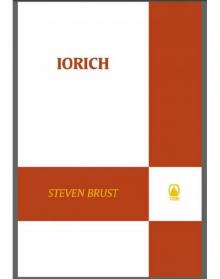 Iorich
Iorich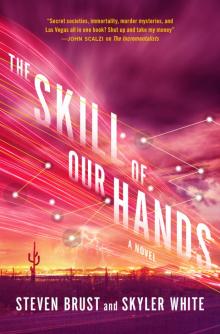 The Skill of Our Hands--A Novel
The Skill of Our Hands--A Novel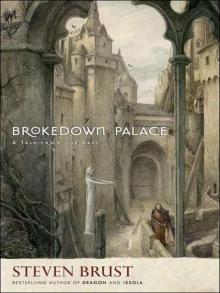 Brokedown Palace
Brokedown Palace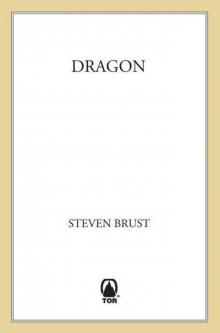 Dragon (Vlad Taltos)
Dragon (Vlad Taltos) Dragon
Dragon Athyra
Athyra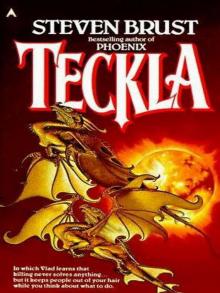 Teckla
Teckla Dzur
Dzur